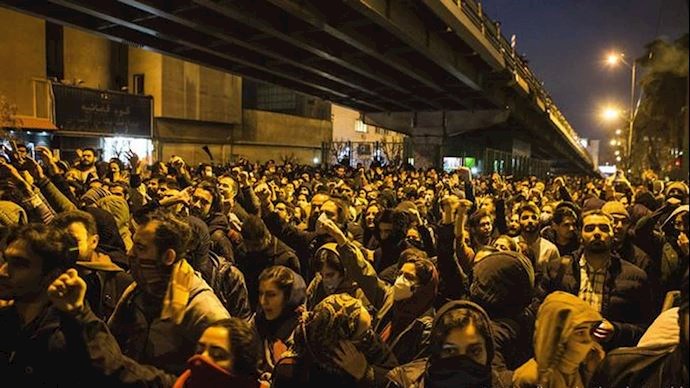Reporting by PMOI/MEK
Iran, June 5, 2020—On the anniversary of the death of Iranian regime founder Ruhollah Khomeini, supreme leader Ali Khamenei praised Khomeini’s bloody legacy of suppressing the Iranian people. He described Khomeini as a “young-minded” person who gave important posts such as the commander of the Revolutionary Guard (IRGC) and important judicial positions to the youth.
Stressing on the youth is a recurring theme in Khamenei’s remarks in the past few months and is in line with his strategy to establish a “young and hezbollahi government” that can guide his regime “through difficult straits.” Although he was careful not to mention the name of the People’s Mojahedin Organization of Iran (PMOI/MEK), he couldn’t avoid acknowledging the Iranian opposition’s current role in the society.
“Even before [Khomeini], there were movements, but their activities were limited to a few students," Khamenei said, trying to downplay the history of the MEK.
Khamenei also described his regime’s defectors as “those who were once revolutionary.” Defections, too, have become a growing concern for Khamenei, especially in the past two years and in the wake of two major uprisings and continued protests.
Ironically, Khamenei didn’t talk about Iran’s coronavirus disaster, which has been marking a record number of cases in the past few days. Instead, he criticized the U.S. for not being able to control the pandemic and not using the experience of others. He didn’t even bother defending his criminal decision to reopen the economy and send people back to work to “resume production” at any cost, which has resulted in another surge in the spread of coronavirus across the country.
Iranian regime President Hassan Rouhani, by neglecting his previous remarks regarding the novel coronavirus epidemic in Iran and his claims of containing this illness, acknowledged on May 30, that Iran’s COVID-19 numbers are on the rise. “The number of coronavirus cases is increasing. Our work has now become even more difficult. If our people believe we will return to pre-coronavirus conditions, it is not so. We will not return to normal circumstances any time soon,” Rouhani said.
Khamenei’s insistence on a “young and hezbollahi” government is a reflection of his fear of the MEK’s role and influence in the Iranian society, their growing support across the country, and younger generations gravitating toward the MEK and their ideals for a free and democratic Iran.
On Tuesday, June 3, the Iranian regime judiciary chief Ebrahim Raisi, known for his role in the summer 1988 massacre of over 30,000 political prisoners, defended the mullahs’ crimes against humanity and said: “In fact, [Khomeini] was the hero of the struggle against the [MEK]. He knew them well. They should not be provided any opportunity at all.”
“Our youths today don’t know who the [PMOI/MEK] are! Because now they’re presenting themselves all nice and tidy… in Europe they’re presenting themselves as very gentlemen-like individuals,” Raisi said with regret.
But the important question is, if as Raisi says, Iran’s youth don’t know the MEK, why is the regime afraid of them to such extent?
Raisi once again acknowledged his role in the 1988 massacre of the political prisoners and said:
“At a meeting that I attended with three or four of our colleagues with [Khomeini], there was a report regarding a number of these cases. When we were leaving, we were all thinking that [Khomeini] is more revolutionary than us. We had gone there to say we are doing this and that… thinking [Khomeini] may say we are going too far. We saw that [Khomeini] is many steps ahead of us and not only did he encourage us, he also said we should pursue these measures with a far more serious drive, and not just in Tehran, but in all other provinces.”
Raisi’s remarks show that the 1988 massacre is seriously questioned even among regime officials. This can be seen in the June 1 remarks of Morteza Moghtadaei, another former Iranian regime official involved in the 1988 massacre.
“At the time we were constantly criticized about the high number of executions… There was something even more important, and I don’t want to mention any names, about one of the officials that lived next door to us… he tried to give me some advice by saying we should refrain from jailing and executions. I said these are orders from [Khomeini] and we follow his orders. Go talk to [Khomeini] and we will stop… I told him that [Khomeini] himself ordered us to continue and to do so with the utmost seriousness. Even these [PMOI/MEK], those who will not repent, [Khomeini] emphasized if they are released from our prisons today, there will be bombings tomorrow. This was [Khomeini’s] specific orders to us and we carried out our measures based on his orders,” Moghtadaei said.
In a program on June 1, the regime’s state-run television read Khomeini’s fatwa against thousands of MEK prisoners for the first time and called for more measures to prevent Iran’s students from becoming attracted to “Rajavi’s charisma.”
The extremely shaky and fragile conditions of the regime on one hand and the growing support for the MEK among the youth on the other hand have created the perfect storm and nightmare for the future of Khamenei’s regime. And Khamenei’s efforts to rejuvenate his regime are proving more futile than ever.





